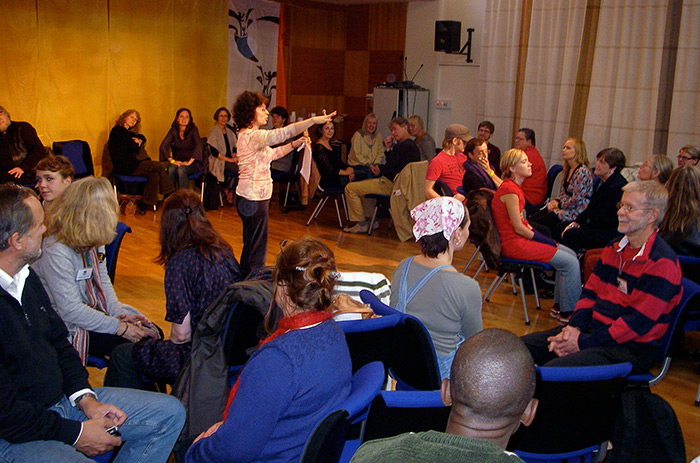On the Move: Storyteller Noa Baum

“I always thought I would go home,” storyteller Noa Baum said one rainy morning over hot chocolate and cappuccino. “I never planned or imagined I would stay in America.”
Noa thought that she would spend five or six years in the United States while her American husband finished his Ph.D. before returning home to Israel. Then her husband was diagnosed with multiple sclerosis and was offered a job in Washington, D.C., so they decided to stay. Noa wouldn’t be going home.
In her memoir, A Land Twice Promised: An Israeli Woman’s Quest for Peace, a testimony to the transformative power of storytelling, Noa recounts feeling:
“a deeper sense of grief—a place so dark and bewildering that I dared not look in and only later managed to give it voice. I had to face the one price for this decision that was perhaps the hardest of all for me: my children would never be Israeli. My children would never be tuned into the rich nuances and intricate multilayers of meaning of my culture and my language, so ancient and beautiful; they would never be able to understand the poems I love so much…”
Still, she was excited about the prospect of her children growing up in the security, peace, and open spaces of America. But she also realized that, as tough as her decision was, her children could always return to her homeland if they wanted to, while so many others cannot.
Noa uses the power of storytelling, an age-old performance art, to help people cope with the challenges of moving to a new community. She believe that through storytelling, we can connect with one another, teach lessons, and feel heard, our experiences validated. Through “story-listening,” we can also learn how others may have had similar experiences, profoundly affecting the way we understand them and ourselves.
There is an art to good storytelling: stories well-told go beyond the anecdotal to resonate with others, drawing listeners to co-create the narrative and imbue it with meaning. As with other art forms, storytelling invites us to experience other perspectives in ways that may have a deep transformative influence on how we understand ourselves and the world around us.
Using storytelling as a powerful peace-building tool, Noa encourages people to use narratives to help people better understand their own experiences, to describe them in a way others can appreciate.
On July 3 and 9 during the 2016 Folklife Festival, Noa will present at the On the Move: Migration and Immigration tent, a space dedicated to exploring the experiences of families and communities, from Basque Americans, immigrants in California, and you. She will be sharing her stories and inviting you to share your stories of when you grappled with being—or unexpectedly found yourself—on the move.
Alissa Stern is the coordinator for On the Move at the 2016 Folklife Festival. She also works with threatened languages in Bali, Indonesia.

